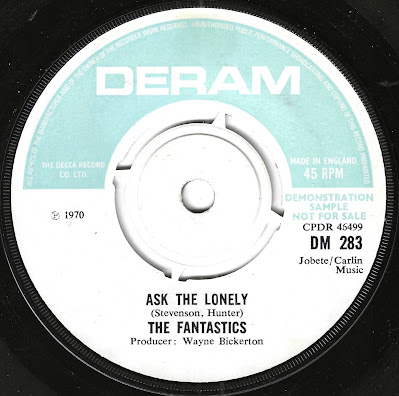
Label: Air-Edel
Year of Release: 1978"By the way, if anyone in here is in advertising or marketing, kill yourself" - so grumbled Bill Hicks to a live audience on his CD "Rant In E Minor", adding
"do a commercial, you're off the artistic roll call". He certainly wasn't the first to complain about creative people selling out with adverts, and the idea that engaging with advertising is evil, even if undertaken simply to make a quick buck while in a financial corner (which even leftists like Ken Loach have done in the past) was a dominant one for decades. It's something which tends to get brought up less frequently now, but still occasionally gets trotted out when a respected artist "whores themselves" for a major business on prime time television.
This was certainly the case when a couple of young people I'm acquainted with (but won't pretend to know well) received some crisp bank notes from the Nationwide to do some adverts recently. I had to watch with dismay as a cascade of abuse filled up my social media timelines, and while the Bill Hicks "Off the artistic roll call!" line was not repeated, it was certainly paraphrased a number of times, despite the fact that Hicks added the disclaimer "If you're a struggling artist [which they were] I'll look the other way". These, it seems, were people not worthy of their calling for taking the Building Society ruble in order to spend more time developing their careers ("Real poets don't have careers!" one angry individual shouted, while staying oddly silent about John Cooper Clarke's Sugar Puff adverts).
Building Societies have always had one eye on the youth market, though, way before banks seemed to get their claws into teens and children. As organisations, they've always been keen to emphasise the possible to people who have perhaps heard rather too often that what they are demanding is unattainable. These days, that seems to be the very idea that a young person can actually have a mortgage, and in the seventies... well actually, the opening sales pitch really wasn't much different then either.
This promotional EP was put together for the Halifax Building Society in 1978, and seems to be, once again, about young whippersnappers saving enough to buy a house, or at least be somewhere they feel they belong. It's a very decadent promotional item indeed, coming housed in a glossy, full colour gatefold sleeve with a printed paper inner sleeve inside, very akin to the plush affairs major labels used to create in the nineties for up-and-coming alternative groups (all it would need is a colour vinyl pressing to complete the effect). It's also pressed up on proper vinyl rather than a flexidisc, and only the sprayed silver "plasticrap" label looks cheap.
It also opens very unexpectedly with a desperate, agitated slice of Pete Townshend aping rock. "Where Are We Going" begins like "Pinball Wizard" (itself used in a bank advert for NatWest in 1988). "Lose all our money in the Palace Arcade/ I swear the one-armed bandit knows that we just got paid!" exclaims the Townshend clone at one point, before adding "When we get together, everybody thinks we're bad/ but all we're doing is searching for things we never had".




























